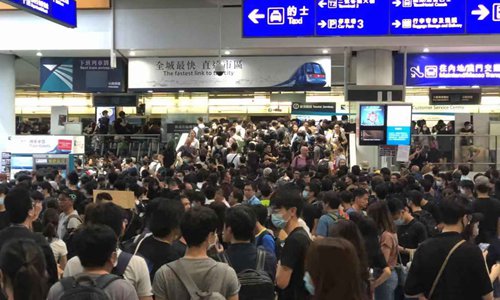HOME >> OPINION,SPECIAL-COVERAGE
Color revolution aims to ruin HK’s future
Source:Global Times Published: 2019/8/13 21:45:52

Black-clad protesters stormed the Hong Kong International Airport, paralyzing the international hub on Monday. Photo: Zhao Juecheng/GT
Is a color revolution taking place in Hong Kong? We think so, although this one is somehow baffling.
The riots in Hong Kong have deviated from the original intent of opposing amendments to an extradition bill, but have become a ruthless destruction of the city's rule of law. Radical protesters want to paralyze the city, undermine the authority of the government and police, demonstrations are no longer a complementary way of expressing demands under the legal framework, but an attempt to overthrow the rule of law and reshape the city's power structure. This is a typical color revolution.
The riots have been evolving in terms of organization and planning, during which political opposition and protesters have integrated and Western forces have offered them various forms of assistance and support. Radical protesters stage demonstrations, extreme political opposition groups distill the political implications of the street protests, while the US and the West put riots on a moral high ground by distorting the facts, confusing right from wrong to mislead Hong Kong society.
Color revolutions across the world were all aimed at regime change. But Hong Kong is not a country. The Hong Kong Special Administrative Region (HKSAR) government needs the authorization of the central government. Therefore, it's meaningless to "overthrow" the HKSAR government.
The first step for Hong Kong's color revolution is to completely paralyze the HKSAR government, police and the rule of law, and undermine Hong Kong's status as an international financial center. By doing so, the radical protesters aim to force the central government to give up governance over Hong Kong, accede to universal suffrage and give the city back to the Western world.
The city's international financial center status and its international shipping industry and tourism are the lifeline of its economy, which have been heavily stricken by riots. If Hong Kong loses its international financial center status, the city's decline is inevitable.
The US and the West won't feel regret for Hong Kong, nor will Asian countries and regions, including Japan, South Korea, Singapore and the island of Taiwan. It is Hong Kong and the Chinese mainland that will suffer the pain. The decline will lead to long-term turmoil in Hong Kong, thereby increasing China's political and economic burden. This is what some American and Western forces want to see.
Some say defining Hong Kong's riots as a color revolution disregards the dissatisfaction of some Hong Kong citizens. They also argue that blaming the US and the West for external interference is to cover up internal problems. All color revolutions have internal reasons, such as poor livelihood, and the widening gap between rich and poor. A color revolution is evil as it ridiculously takes "democracy" as the prescription for deep-seated economic problems.
All countries that underwent color revolutions in the past 20 years have borne the consequences of long-term turmoil and further economic decline. The US and the West have promoted the color revolutions, but shirked their responsibilities for the bitter results.
The Chinese government will never allow extreme opposition and the West to pull Hong Kong into the anti-China camp, nor will it allow the city to slip into long-term chaos or become a base for the West to subvert China's political system. This is a grim fight between attempts to deprive and defend the city's international financial center status.
Hong Kong's international financial center status matters to the livelihood of Hongkongers, and is where their core interests lie. Therefore, it's also a fight for Hongkongers to safeguard their living. The mainlanders are their staunch supporters.
Posted in: EDITORIAL,OPINIONS